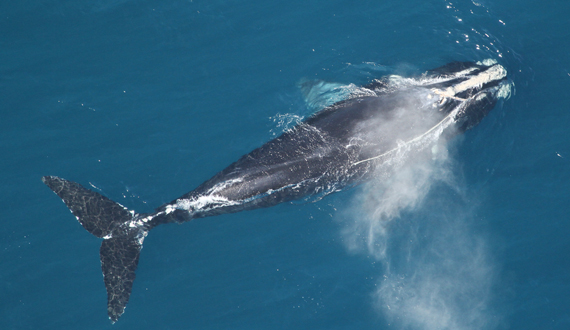Group says NOAA must strengthen safeguards and improve enforcement to save this species from extinction

Oceana released a new report finding that most boats are speeding through slow zones designed to protect critically endangered North Atlantic right whales, of which only around 340 remain. Oceana analyzed boat speeds from November 2020 through July 2022 in slow zones established by the National Oceanic and Atmospheric Administration (NOAA) along the U.S. East Coast and found that 84% of boats sped through mandatory slow zones, and 82% of boats sped through voluntary slow zones. This report, which provides an update from Oceana’s 2021 analysis, shows that stronger safeguards and increased enforcement are needed to save North Atlantic right whales.
Boat strikes are one of the top threats to North Atlantic right whales, which can cause death or injury from blunt-force trauma or propeller cuts. Studies have found that limiting boat speeds to 10 knots is estimated to reduce a North Atlantic right whale’s risk of death from being killed by a boat over 65 feet by between 80% and 90%. While this report only analyzed boats 65 feet or larger, boats of all sizes can cause fatal injuries to right whales, as demonstrated in February 2021 when a 54-foot recreational boat struck and killed a calf. Current speed restrictions only apply to vessels 65 feet or greater, yet three of the four known vessel strikes of mother and calf pairs since 2020 have involved vessels between 35 and 65 feet.
“Boats are speeding, and whales are dying — it’s just that simple,” said Oceana Campaign Director Gib Brogan. “It’s clear that boats are still not abiding by the speed limits and are continuing to make the ocean a dangerous place for North Atlantic right whales. Time and time again we see what happens when speeding boats and right whales collide. Even one human-caused death is too many for this population to sustain. If NOAA wants to save this species from extinction, ships must slow down when these whales are present, and speeding boats must be held accountable. Time is of the essence before North Atlantic right whales reach the point of no return.”
Read the full press release here:
Press Release Date: October 19, 2023
Location: Washington, DC
Contact:
Raigan Johnson, Megan Jordan | email: rjohnson@oceana.org, mjordan@oceana.org
Raigan Johnson, Megan Jordan